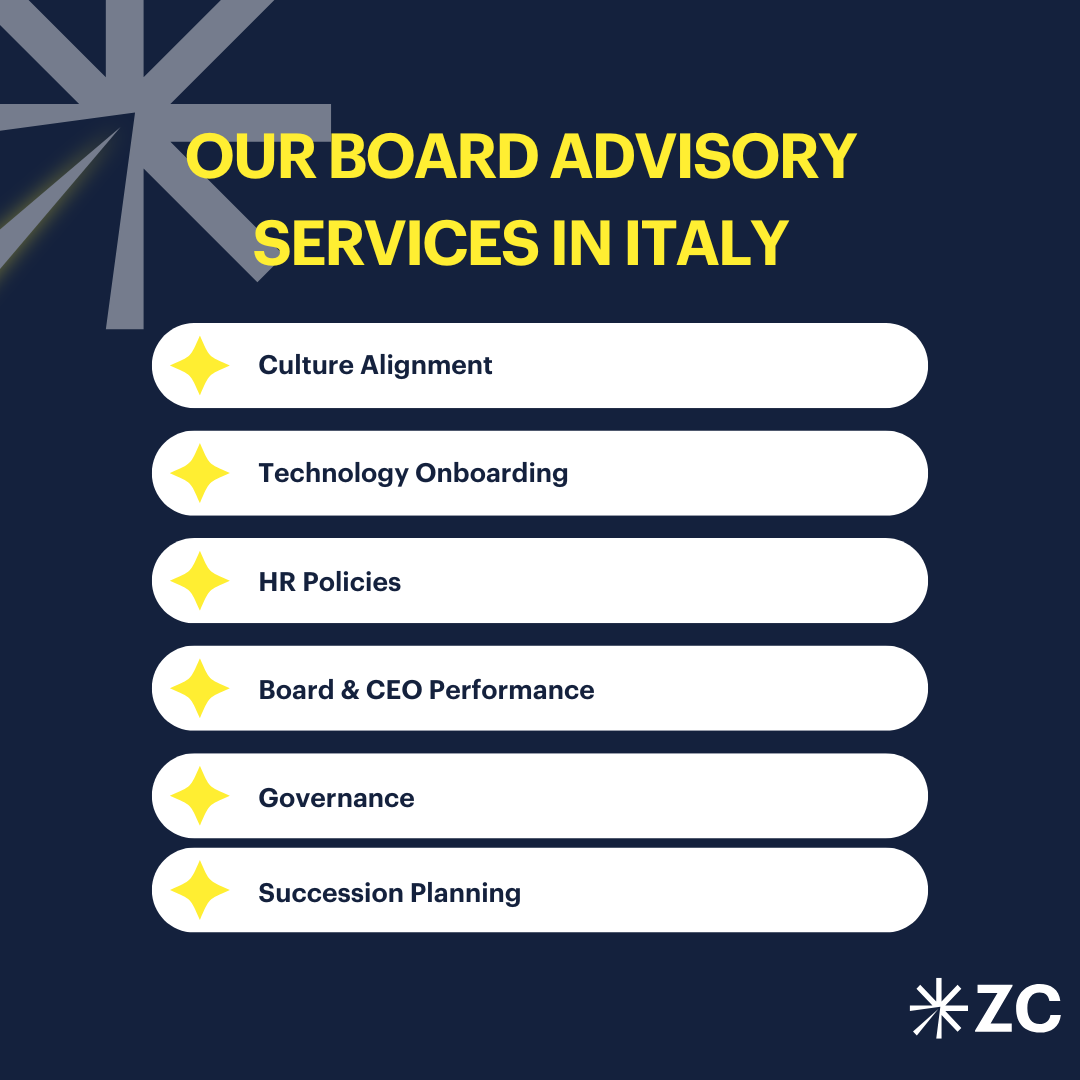The Current Business Landscape and Need for Board Advisory in Italy
Italy, Eurozone’s third-largest economy, has continued to struggle for recovery with GDP growth estimated at 0.5% for 2024 (the government had previously estimated for its economic growth to be 1%). Business confidence is improving, while consumer sentiment is cautious, and the overall economic outlook remains mixed.
What is the key obstacle ahead for Italian companies? The answer is low productivity, partly because of the entrenched affinity for nepotism, and relatively few executive appointments based on merit. Studies estimate poor selection practices to be responsible for a 16% productivity loss at the whole-economy level, and even more glaringly for small to medium businesses – family firms being culprits in the driver seat to limited value creation.
Uncertainty driven by the radical transformation in organizations, ongoing regulatory scrutiny regarding their ESG position, and fear of gender disparity in leadership teams is more complex than simple governance hurdles for Italian companies.
Top Challenges for Board Advisory in Italy Today
- Governance Gaps – There are increased levels of shareholder engagement for advancing firms to be accountable for proactive and reactive disclosures on board and executive pay, yet many Italian firms continue to lack transparency and independence that is conflicted. Partisan politics exert pressure on leadership structures of captive state-owned enterprises and gender parity, which continue to be a hurdle. A good example is the disagreement between the Cassa Depositi e Prestiti (CDP) and guardian of 40% female representation within the governing body.
- Inertia – Many Italian family-owned firms look to their own advisory networks, and do not apply external advisory talent, missing what would be critical urgency regarding transformations that may be necessary.
- Digital & ESG Skill Gaps – Boards and senior leadership teams fail to identify individuals who are subject matter experts in digital strategy, AI, sustainability, and corporate innovation, key governance roles in the modern age.
Executive Search: A Key Driver of Board Advisory Success in Italy
Despite the challenges, there are incredible opportunities for board advisory in Italy – especially with the guidance of specialized talent partners.
- Board Modernization – Executive Search can help introduce talent to organizations with experience in tech, ESG and corporate restructurings, areas where Italian boards are underrepresented and need help.
- Gender Diversity requirements – Italy has stringent gender board quotas for listed companies. Support from executive search firms enables organizations to identify and appoint qualified female leaders, strengthening their reputation, ensuring compliance, and aligning with regulatory requirements.
- Booming Private Equity – The private equity and M&A market is booming in Italy, especially in Milan. In the first half of 2024, the deal volume for private equity or M&A closings were at nearly €47 billion. As private capital continues to flow into organizations in Italy, the need for board members who have experience with governance in fast-scaling industries is growing.
- Missing Meritocracy – Executive Search will allow companies to locate the best independent leadership candidates beyond networking, creating a pathway that utilizes data, performance indicators, and structured evaluation instead of nostalgia, and disappointment.
By the Numbers: What’s Fueling the Need for Board Advisory in Italy
- GDP growth for 2024: +0.5%
- Private credit growth (EU average): +17% YoY
- Gender quota on Italian boards: 40% minimum female.
- Effect of non-meritocratic hiring on productivity -16%
What executive search can deliver
As an executive search and board advisory firm in Italy, this is where you can provide the real value:
- Talent Mapping – Locate independent directors with skillsets in tech, sustainability, and digital transformation.
- Diversity and Inclusion – Allow the organizations to fulfill their legal obligations, and enhance their decision making by encouraging alternative perspectives.
- M&A and private equity experience – Companies need board members who understand the degree of knowledge it takes to operate in the fast-paced, investment-driven environment.
- Crisis-ready governance – introducing talent with backgrounds in strategic planning and crisis management can help teams navigate turbulence.

Italy’s unstable economy, dynamic regulatory situation, urgent need to digitize has created the ultimate opportunity for modern effective board advisory.
The right executive search firm goes beyond simply adding names to a list. It focuses on building future-ready, independent leadership structures that drive real impact.
By allowing companies in Italy, the opportunity to develop diverse, trustworthy boards you are not only selling a service, you are acting as a strategic operator on their spy to evolve.









